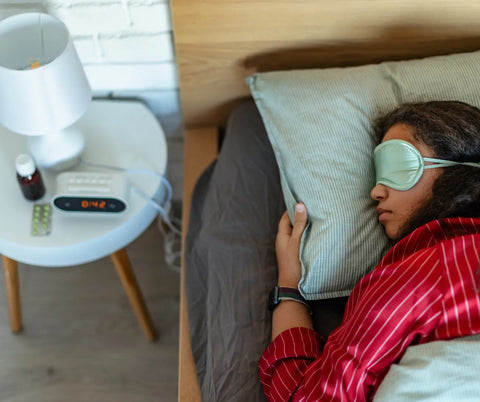Your Cart is Empty
- Shop
- About
- Learn
- Free Domestic Shipping Over $50
- +1(800)929-8935
- Login
- Free Domestic Shipping Over $50
- +1(800)929-8935

Melatonin has emerged as a popular and natural solution for those struggling with sleep-related issues.
Whether you're trying to combat insomnia, adjust to a new travel schedule, or manage the irregular hours of shift work, melatonin supplements offer a potential remedy by mimicking the body’s own sleep-regulating hormone.
Understanding how much melatonin you should take to achieve the best results without adverse effects is crucial.
This comprehensive guide will provide the insights you need, whether you're considering melatonin for the first time or seeking to optimize its benefits.

Melatonin, a hormone produced by the pineal gland, plays a crucial role in managing our circadian rhythms, commonly known as the sleep-wake cycle. It is synthesized naturally from serotonin when exposed to darkness, signaling the body that it's time to prepare for sleep.1
This makes melatonin essential for those who have difficulty falling asleep or those who experience disruptions in their sleep patterns.
Melatonin supplements are frequently used as a natural method to enhance sleep quality and regulate sleep patterns. Here are some of the key reasons individuals choose to use melatonin supplements:1, 2
Insomnia: Many people use melatonin to help manage insomnia, which involves difficulty falling asleep or staying asleep. Melatonin can help by adjusting the body’s internal clock, promoting quicker onset of sleep.
Delayed Sleep Phase Syndrome (DSPS): This disorder is characterized by a significant delay in the major sleep period, which results in difficulties falling asleep and waking up at conventional times. Melatonin supplementation can help reset the body’s clock to a more typical sleep time.
Jet Lag: Traveling across multiple time zones can disrupt the body's natural sleep-wake cycle. Melatonin can help reduce the effects of jet lag by syncing the body’s internal clock to the new time zone faster than it would on its own.
Shift Work Disorder: Shift workers often struggle with sleep disturbances due to working nights or rotating shifts. Melatonin can be beneficial in regulating sleep for those whose normal sleep schedule is at odds with their work schedule.
Seasonal Affective Disorder (SAD): Often occurring during the winter months when daylight hours are reduced, SAD can be mitigated by melatonin,which helps regulate the sleep-wake cycle that might be thrown off by changes in natural light exposure.
General Sleep Regulation: Melatonin supplementation can help establish a more consistent sleep schedule for individuals with irregular sleep patterns, whether due to lifestyle choices or external factors like stress.
These points illustrate the diverse applications of melatonin as a supplement, reinforcing its role as a supportive aid in managing various conditions related to sleep and circadian rhythm disturbances.

For adults beginning melatonin supplementation, the recommended starting dose usually ranges from 0.5 to 5 milligrams, taken about one hour before bedtime.3
It's advisable to start with the lowest dose and adjust based on effectiveness and tolerance to find the optimal amount needed to improve sleep without causing next-day drowsiness.
Melatonin dosage can vary depending on the specific sleep issue. For instance, lower doses are typically effective for trouble falling asleep, while higher doses may be required for issues with staying asleep or for conditions like non-24-hour sleep-wake disorder.
Melatonin supplementation needs can vary significantly across different age groups. Here's how dosage guidelines typically differ:4
Young and Middle-aged Adults: For this group, melatonin dosages typically range from 0.5 to 5 milligrams, depending on individual needs and responses. This dose helps manage typical sleep disturbances or aid in falling asleep faster.
Older Adults: Due to the natural decline in melatonin production as one ages, older adults may find that even lower doses are effective. Starting at doses as low as 0.1 to 0.3 milligrams can often be sufficient to promote better sleep without causing morning grogginess.

General Use in Young Populations: Melatonin should be administered with caution in children and only under the guidance of a healthcare provider. The doses, often lower than those for adults, must be carefully adjusted to avoid potential side effects.
Children with Sleep Onset Problems: Pediatricians might recommend melatonin for children who have significant difficulties falling asleep at a conventional bedtime. The dosage is usually kept low and tailored to the child’s specific needs.5
Children with Neurodevelopmental Disorders: For children with conditions such as autism spectrum disorder (ASD) or attention-deficit/hyperactivity disorder (ADHD), melatonin can be particularly helpful in establishing a sleep routine. Doses are adjusted based on individual sensitivity and the presence of other medications.5
These recommendations highlight the importance of considering age and specific health conditions when determining the appropriate melatonin dosage. Always consulting with a healthcare provider ensures that the use of melatonin is safe and effective for each individual, regardless of age.
The ideal melatonin dose can vary significantly among individuals due to factors such as age, body weight, and metabolic rate. For instance, older adults may find that lower doses of melatonin are more effective due to the natural decrease in melatonin production with age.6
Likewise, body weight can influence how much melatonin an individual needs to achieve the desired effect on sleep, with higher doses potentially necessary for those with a higher body mass.

Interactions between melatonin supplements and other medications can also affect the appropriate dosage. For example, melatonin can interact with blood pressure medications, altering their effectiveness or causing additional side effects.
Health conditions such as epilepsy or seizure disorders may affect the seizure threshold when combined with melatonin, necessitating careful monitoring by a healthcare provider.
The effectiveness of melatonin is dependent on biological and medical factors as well as environmental and lifestyle influences.
Exposure to blue light from screens before bedtime can suppress natural melatonin production, potentially requiring a higher dose of supplemental melatonin to overcome this effect.
Similarly, individuals who have irregular sleep schedules or who are exposed to little natural light during the day might need adjusted dosages to better regulate their sleep-wake cycles.
The timing of melatonin administration is crucial for maximizing its benefits. The general recommendation is to take melatonin 30 to 60 minutes before bedtimeto align with the body's natural sleep-wake cycle.1
This helps facilitate the onset of sleep and ensures that the supplement works in conjunction with the body's own physiological processes.
Melatonin is available in several forms, including tablets, capsules, liquids, and gummies. Each form has different absorption rates and bioavailability, which can influence how quickly and effectively melatonin acts.
For instance, liquid melatonin may be absorbed faster than tablets, making it a preferable option for those who need a quick onset of sleep. It’s important to consider personal preferences and medical advice when selecting the form that best suits individual needs.

Exceeding the recommended melatonin dose can lead to several adverse effects, which may include dizziness, headaches, prolonged drowsiness, and disruption of normal sleep patterns. In more severe cases, an overdose might cause hormonal imbalances or mood disturbances.7
If an overdose occurs, it is essential to discontinue use and consult a healthcare provider for guidance. Symptoms are typically mild and can be managed with professional advice and supportive care. It’s crucial to monitor for any unusual symptoms and seek medical attention if they persist or worsen.
While melatonin is generally considered safe for short-term use, long-term use carries potential risks, including dependency and diminished response to the hormone. Regularly reviewing the necessity and dosage of melatonin with a healthcare provider is advisable to mitigate these risks and ensure the safe use of the supplement.
What is the recommended dose of melatonin for adults trying to improve sleep?
For adults seeking to improve sleep, a melatonin dose ranging from 0.5 to 5 milligrams taken 30 to 60 minutes before bedtime is typically recommended.
Can children safely take melatonin for sleep issues?
Melatonin can be safe for children when prescribed by a healthcare provider, with dosages adjusted according to the child's age and specific sleep needs.
How long does it take for melatonin to work?
Melatonin generally begins to take effect within 30 to 60 minutes, making it best to take it shortly before bedtime.
Are there any risks associated with long-term use of melatonin?
Long-term use of melatonin may lead to dependency or decreased effectiveness and should be monitored by a healthcare professional.
Can melatonin help with shift work sleep disorder?
Yes, melatonin can be beneficial for shift workers as it helps adjust the body’s internal clock to accommodate unconventional working hours.
Melatonin supplementation requires a careful balance of understanding the right dosage, recognizing how individual factors influence its effectiveness, and knowing the potential risks of overuse.
As with any supplement, personalization is key—what works well for one person may not be suitable for another. Always start with the lowest possible dose and adjust based on your body’s response and the specific sleep challenges you face.
More importantly, engaging in regular consultations with a healthcare provider will ensure that your use of melatonin supplements is both safe and effective. Remember, the goal of using melatonin is not just to promote immediate sleep but to support long-term, healthy sleep patterns that contribute to overall well-being.
Looking for a natural alternative to melatonin? Mellodyn Sleep Easy works with your body's own sleep mechanisms to promote healthy, restorative sleep without dependency.
Discover a better sleep solution with Mellodyn.
Savage RA, Zafar N, Yohannan S, et al. Melatonin. [Updated 2022 Aug 8]. In: StatPearls [Internet]. Treasure Island (FL): StatPearls Publishing; 2024 Jan-. Available from: https://www.ncbi.nlm.nih.gov/books/NBK534823/
Auger, R. R., Burgess, H. J., Emens, J. S., Deriy, L. V., Thomas, S. M., & Sharkey, K. M. (2015). Clinical Practice Guideline for the Treatment of Intrinsic Circadian Rhythm Sleep-Wake Disorders: Advanced Sleep-Wake Phase Disorder (ASWPD), Delayed Sleep-Wake Phase Disorder (DSWPD), Non-24-Hour Sleep-Wake Rhythm Disorder (N24SWD), and Irregular Sleep-Wake Rhythm Disorder (ISWRD). An Update for 2015: An American Academy of Sleep Medicine Clinical Practice Guideline. Journal of clinical sleep medicine : JCSM : official publication of the American Academy of Sleep Medicine, 11(10), 1199–1236. https://doi.org/10.5664/jcsm.5100
Costello, R. B., Lentino, C. V., Boyd, C. C., O'Connell, M. L., Crawford, C. C., Sprengel, M. L., & Deuster, P. A. (2014). The effectiveness of melatonin for promoting healthy sleep: a rapid evidence assessment of the literature. Nutrition journal, 13, 106. https://doi.org/10.1186/1475-2891-13-106
Givler, D., Givler, A., Luther, P. M., Wenger, D. M., Ahmadzadeh, S., Shekoohi, S., Edinoff, A. N., Dorius, B. K., Jean Baptiste, C., Cornett, E. M., Kaye, A. M., & Kaye, A. D. (2023). Chronic Administration of Melatonin: Physiological and Clinical Considerations. Neurology international, 15(1), 518–533. https://doi.org/10.3390/neurolint15010031
Edemann-Callesen, H., Andersen, H. K., Ussing, A., Virring, A., Jennum, P., Debes, N. M., Laursen, T., Baandrup, L., Gade, C., Dettmann, J., Holm, J., Krogh, C., Birkefoss, K., Tarp, S., & Händel, M. N. (2023). Use of melatonin for children and adolescents with chronic insomnia attributable to disorders beyond indication: a systematic review, meta-analysis and clinical recommendation. EClinicalMedicine, 61, 102049. https://doi.org/10.1016/j.eclinm.2023.102049
Tordjman, S., Chokron, S., Delorme, R., Charrier, A., Bellissant, E., Jaafari, N., & Fougerou, C. (2017). Melatonin: Pharmacology, Functions and Therapeutic Benefits. Current neuropharmacology, 15(3), 434–443. https://doi.org/10.2174/1570159X14666161228122115
Tuft, C., Matar, E., Menczel Schrire, Z., Grunstein, R. R., Yee, B. J., & Hoyos, C. M. (2023). Current Insights into the Risks of Using Melatonin as a Treatment for Sleep Disorders in Older Adults. Clinical interventions in aging, 18, 49–59. https://doi.org/10.2147/CIA.S361519